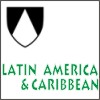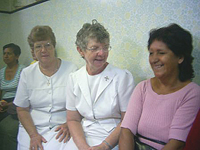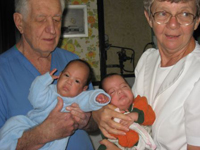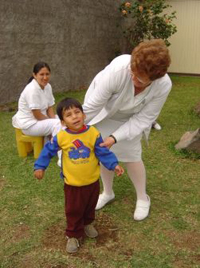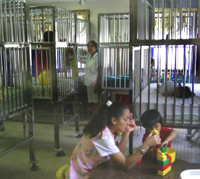Chimbote, Peru
Centro
de Obras Sociales – The Hub of Activity
Joyce Ann Hertzig, OP (Grand Rapids)
Joyce Ann Hertzig, OP, a member of the Grand Rapids General
Council, visited Peru in January/February 2007 and brought back several
stories about the people she met and the ministry of Dominicans in
the mountains.
CHIMBOTE, PERU—The workday at Centro de Obras
Sociales, the Center for Social Works, Chimbote, starts at 7:00
am and ends at 8:00 pm or later Knowing how difficult it is for
patients to travel, a staff person cannot say, “come back
the next day” unless absolutely necessary. . No one is
turned away if the service needed is provided by the center.
The Maternity Clinic (Materindad) meets with 250 mothers and
children. The Postamedica, the outpatient service, treats about
150 persons each day. This does not include the people who come
for classes, such as, prenatal stimulation, La Maz, the
nutrition program, TB program, laboratory work or even maternal
deliveries.
Margaret Mary Birchmeier, OP, RN (Grand Rapids) a certified midwife
is the Director of the maternity hospital and says that the Center
needs to update the present facilities. This includes extending
the maternity unit and renovating the outpatient area. The average
monthly birthrate is almost 200. According to Margaret Mary,
the dreams for the future are not so much for more space, but a
dream to improve the quality of care.
Besides Sr. Margaret Mary, medical services are directed by Lillian
Bockheim, OP, (Grand Rapids) a licensed practical nurse and director
of the out-patient clinic. Dr. Cesar Cáseres, a laboratory
pathologist is director of the clinical laboratory; Teresa Salinas,
also professional midwife is personnel director of the Center
and Father Jules Roos, administrator.
The first day I arrived in Chimbote, there were 14 births. Sister
Margaret Mary explained that the early days deliveries took place
at in the mother’s home. Deliveries were simple and as
clean as could be -- given that the house typically had a dirt
floor. In the early 1960s, Maternidad consisted of 13
beds and a delivery room. With the establishment of the Center,
this allowed the sister midwives to serve more families than
was possible with home deliveries. Today the Maternidad has
50 beds and two delivery rooms. Mothers and babies stay for two
days, receive instructions on postnatal care and are followed
up with visits for one year. The baby is followed until age five.
Over the years, the Center has added a laboratory, an ultrasound
machine, “at risk” baby incubators and hydration
units. The out-patient clinic utilizes the services of the Center’s
laboratory and pharmacy, which serves about 200 people a day.
Recently, more orphans are coming tothe Center, sometimes babies
left at the doorstep, or their parents have been lost in recent
violence in the city. Other babies come with birth defects or
blindness. No one is left untreated. Through the loving care
and program of the physical therapists, babies who were not expected
to have made progress are doing well.
The number of people in line early each morning gives witness
to the credibility and success of the Center. The clients who
receive a home visit from the Center staff welcome them with
open arms and hugs, neighbors ask questions and mothers make
the effort come to the center on the same day as the visit. The
most important concern is for the needs of the patients, and
money comes second. If someone cannot pay the normal rate, a
sliding scale helps them. Patients who are recommended from another
hospital pay whatever is the standard rate at the hospital for
Chimbote. The lab does work for other medical facilities in the
area and thus these payments, along with the ultrasound service,
provide funds for care of the poor.
The Center found its beginnings 40 years ago. Fathers Ray Moore
and Jules Roos, St. James Society Fathers, were in Chimbote.
They found that mothers were bringing babies to them to be baptized
but they were already dead. There was an unacceptably high rate
of infant mortality. Grand Rapids Dominican Prioress, Mother
Mary Victor Flannery, was asked to send Sister nurse/midwives
to alleviate the suffering and thus, the medical mission in Chimbote
was founded. When the sisters came, they faced a simple open
space and began from there. In 1971, a clinical laboratory was
constructed to provide physicians with more adequate diagnosis
and this facilitates better, more specific treatment. This service
has been made available to other health facilities in the area
requiring such service.
The Center works in collaboration with the Diocese of Pittsburgh.
An annual benefit dinner held by the Chimbote Foundation provides
resources for the work in Chimbote. Others also contribute. College
and university medical students and professors provide medical
students/nurses with field experience working with the Center.
The people of Chimbote, Peru, know the joy and hope of God through
a hand offered in healing, a clean and caring place to recover
from illness. A hug on the street, a greeting from a taxi, a
hand extended in support all give witness to the commitment of
Dominicans to preach a Word of hope and healing. |
RELATED
LINKS
Dominican Apostles
Maternity Hospital
Home Visits
|


